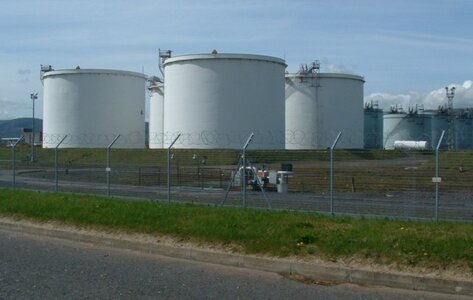To: the European Union (EU) and the International Energy Agency (IEA)
Fossilfree strategic petroleum reserves

We request that the EU and the IEA compensate the CO2 in their strategic petroleum reserves through emissions trading and increase the level of biofuels in the strategic petroleum reserves by 10% (compared to the biofuel content mixed into fossil fuels on a national level).
Why is this important?
As known, in the European Union (EU), Council Directive 68/414/EEC of 20 December 1968 announced that all 28 member states are required to have a strategic petroleum reserve within the territory of the E.U. equal to at least 90 days of average domestic consumption.
Similarly, the International Energy Agency (IEA), announced in the March 2001 agreement, that all 28 IEA members must have a strategic petroleum reserve equal to 90 days of the previous year's net oil imports for their respective countries.
Both the EU and the IEA aim for their member states to reduce their greenhouse gas emissions by at least the emission goals pledged by countries under the United Nations Framework Convention on Climate Change (UNFCCC) -see http://www.iea.org/topics/climatechange/ - or
even exceed those goals ( http://ec.europa.eu/clima/policies/strategies/2030/index_en.htm , http://ec.europa.eu/clima/policies/strategies/2050/index_en.htm ).
It is thus in the interest of the EU and the IEA, to start reducing the use of fossil fuels, wherever possible (which in practice relates to any activities in public/government control). The strategic petroleum reserves (see https://en.wikipedia.org/wiki/Global_strategic_petroleum_reserves ) are one such activity, controlled by the government, which can be transformed easily.
By biofuels, we mean fuels such as:
* straight vegetable oil (corn, olive, peanut, camelina, avocado, sesame, oil palm, soy, safflower, coconut): which can be used to run 2-stroke Diesel engines, and converted 4-stroke Diesel engines
* biodiesel: can be used to run 4-stroke Diesel engines, without modification
* ethanol: can be used to run gasoline engines (with minor modification)
* biobutanol: can be used to run gasoline engines (without modification)
One possible downside is the price of the biofuels, which are currently still higher than the price of fossil fuels. Only in the case of straight vegetable oil it is cheaper (when compared with fossil diesel fuel).
It should be noted however that on the long term, switching to biofuels instead of fossil fuels will actually be cheaper, as:
* it helps to kickstart the green economy/green fuels industry by convincing farmers of starting to grow biofuel crops, ...
* it helps countries to avoid some costs caused due natural disasters in turn caused by climate change ( https://en.wikipedia.org/wiki/Stern_Review )
* ...
Some prices:
* Fuel oil: 0,55 euro/l
* Cheapest SVO (supermarket price, salad oil, in containers, not bulk): 0,53 euro/l
Similarly, the International Energy Agency (IEA), announced in the March 2001 agreement, that all 28 IEA members must have a strategic petroleum reserve equal to 90 days of the previous year's net oil imports for their respective countries.
Both the EU and the IEA aim for their member states to reduce their greenhouse gas emissions by at least the emission goals pledged by countries under the United Nations Framework Convention on Climate Change (UNFCCC) -see http://www.iea.org/topics/climatechange/ - or
even exceed those goals ( http://ec.europa.eu/clima/policies/strategies/2030/index_en.htm , http://ec.europa.eu/clima/policies/strategies/2050/index_en.htm ).
It is thus in the interest of the EU and the IEA, to start reducing the use of fossil fuels, wherever possible (which in practice relates to any activities in public/government control). The strategic petroleum reserves (see https://en.wikipedia.org/wiki/Global_strategic_petroleum_reserves ) are one such activity, controlled by the government, which can be transformed easily.
By biofuels, we mean fuels such as:
* straight vegetable oil (corn, olive, peanut, camelina, avocado, sesame, oil palm, soy, safflower, coconut): which can be used to run 2-stroke Diesel engines, and converted 4-stroke Diesel engines
* biodiesel: can be used to run 4-stroke Diesel engines, without modification
* ethanol: can be used to run gasoline engines (with minor modification)
* biobutanol: can be used to run gasoline engines (without modification)
One possible downside is the price of the biofuels, which are currently still higher than the price of fossil fuels. Only in the case of straight vegetable oil it is cheaper (when compared with fossil diesel fuel).
It should be noted however that on the long term, switching to biofuels instead of fossil fuels will actually be cheaper, as:
* it helps to kickstart the green economy/green fuels industry by convincing farmers of starting to grow biofuel crops, ...
* it helps countries to avoid some costs caused due natural disasters in turn caused by climate change ( https://en.wikipedia.org/wiki/Stern_Review )
* ...
Some prices:
* Fuel oil: 0,55 euro/l
* Cheapest SVO (supermarket price, salad oil, in containers, not bulk): 0,53 euro/l